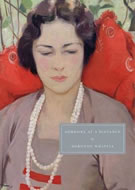
Above is an image of the end paper in the Persephone edition
This is a novel very much of it’s time – 1930s England. It’s about women and education and the role of women of a particular class at a particular time. None of the women have been educated for anything but marriage and if they doesn’t happen or the marriage fails then they are left floundering without any way of earning their keep. Without marriage their lives are doomed to girlish silliness and boredom.
Here is the description from Persephone …
The setting for this the third novel is Saunby Priory, a large house somewhere in England which has seen better times. We are shown the two Marwood girls, who are nearly grown-up, their father, the widower Major Marwood, and their aunt; then, as soon as their lives have been described, the Major proposes marriage to a woman much younger than himself – and many changes begin. ‘The Priory is the kind of book I really enjoy,’ wrote Salley Vickers in the Spectator, ‘funny, acutely observed, written in clear, melodious but unostentatious prose, it deserves renewed recognition as a minor classic. Whipple is not quite Jane Austen class but she understands as well as Austen the enormous effects of apparently minor social adjustments…Christine is a true heroine: vulnerable, valiant, appealing, and the portrait of her selfless maternal preoccupation, done without sentiment and utterly credible, is one of the best I have ever come across. The final triumph of love over adversity is described with a benevolent panache which left me feeling heartened about human nature… A delightful, well-written and clever book.’
The lives of several women are portrayed in this novel. The two sisters; Christine and Penelope, Anthea, the unmarried women (called sheep by the sisters), Aunt Victoria (the sisters’ aunt) and the servants (Bertha and Bessie).
Upper class women are trained at home (unlike the sons who attend school and then university). They are expected to marry and if they don’t then they remain at home – no chance of a career or independence.
Victoria has never married and she is expected to keep house for her brother after his first wife dies. In his opinion she does this poorly and he is compelled to marry Anthea in an effort to have his house run smoothly. Victoria is not interested in the house she simply wants to paint (badly it would seem). Anthea is in love with the Major but is quickly disillusioned and transfers all of her attention to her pregnancy and then her children (children are the great advantage of marriage it gives the women something on which to focus not mention things to do).
Christine falls in love and marries a dashing young man – he turns out to be too dashing and they separate. At this stage they have a child. Christine returns home, but there isn’t the money to maintain her. She must find a job, but she is qualified for nothing. In the end she finds a job in a beauty salon (because she is a ‘lady’).
Penelope marries simply to escape the family home. She is determined that she will not have children and makes this a condition of her marriage. Consequently she is bored and restless.
None of the women have much control of their lives – the best they can hope for is to be pampered.
From a social history point of view this novel is fascinating. The domestic routine, the servants and the day to day activities of people without the need of employment.
I found it a bit long winded particularly the section where Christine was working in London, but it’s an easy read and I encourage anyone interested in domestic fiction to read it.
Here are some other reviews …
http://karensbooksandchocolate.blogspot.com/2010/12/priory-by-dorothy-whipple.html
http://agirlwalksintoabookstore.blogspot.com/2009/04/review-priory-by-dorothy-whipple.html
http://abookaweek.blogspot.com/2008/05/priory-by-dorothy-whipple.html







